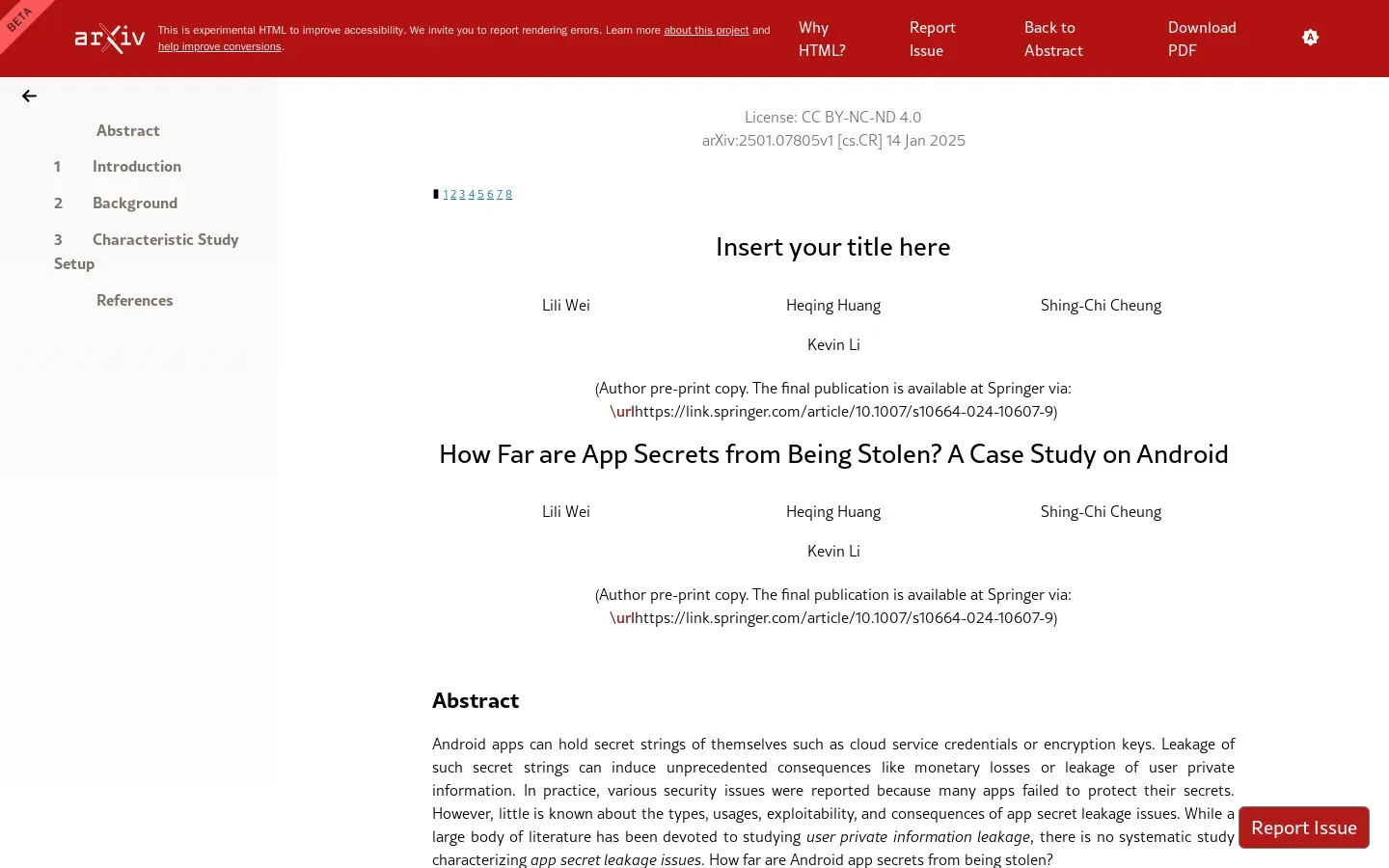
Research Highlights Android App Secrets and Security Practices
/ 4 min read
Quick take - A recent study has revealed critical insights into the security risks associated with app secret leakage in Android applications and transaction-reverting statements in Ethereum smart contracts, aiming to improve security practices for developers and enhance the resilience of blockchain technologies.
Fast Facts
- Research Focus: The study investigates app secret leakage in Android apps and transaction-reverting statements in Ethereum smart contracts to improve security practices for developers and blockchain resilience.
- Key Findings: A significant percentage of Android apps contain hard-coded secrets, and behavioral analysis revealed common vulnerability scenarios; transaction-reverting statements impact smart contract execution.
- Security Recommendations: Developers are urged to adopt better secret management practices, including OAuth 2.0 for API validation and automated code reviews, alongside regulatory compliance strategies.
- Educational Initiatives: The research emphasizes the need for training programs on secure coding practices to mitigate risks associated with secret leakage.
- Future Directions: Proposed advancements include developing machine learning-based detection tools and collaborating with cloud service providers to enhance data security in mobile and blockchain applications.
In the rapidly evolving landscape of cybersecurity, the protection of sensitive information has become paramount. The recent research into the leakage of app secrets in Android applications and the security practices surrounding Ethereum smart contracts sheds light on critical vulnerabilities that developers must address to safeguard user data and maintain the integrity of blockchain transactions. As mobile applications proliferate and smart contracts gain traction in various industries, understanding the intricacies of secret management and transaction reliability is essential for building resilient systems.
The study emphasizes the role of advanced detection tools and techniques that aid in identifying, analyzing, and categorizing app secrets. Among these, Regular Expressions (Regex) have proven effective for pinpointing potential vulnerabilities embedded within application code. Additionally, tools like ApkTool facilitate reverse engineering, allowing developers to dissect APK files and uncover hard-coded secrets that could be exploited by malicious actors. The implications are profound: as more apps incorporate sensitive APIs, the risk of exposure rises, necessitating robust validation methods such as the SecretValidator framework that evaluates extracted credentials for integrity and authenticity.
The analysis extends beyond mere identification; it delves into the temporal aspects of credential usage. Understanding how long secrets remain valid before they become outdated or compromised is crucial. This temporal analysis not only aids in assessing security implications but also informs developers about best practices for managing secret lifecycles effectively. By integrating automated detection systems with real-time monitoring capabilities, teams can enhance their incident response strategies, significantly reducing the window of opportunity for attackers.
In tandem with these technical measures, there is a pressing need for improved educational initiatives that foster awareness among developers regarding secure coding practices. Training programs focusing on methodologies to mitigate risks associated with app secret leakage should be prioritized. Developers must be equipped not just with tools but with the knowledge to apply them thoughtfully in various scenarios. This includes understanding common patterns where transaction-reverting statements are utilized in Ethereum smart contracts—a key component that influences contract execution and user experience.
The findings from this research highlight a crucial intersection between theoretical exploration and practical application in cybersecurity. By proposing enhanced security guidelines tailored for both Android developers and Ethereum contract creators, the study aims to bridge existing gaps in knowledge and implementation. Recommendations include establishing clear policies for secret management and advocating for rigorous code review processes to identify exploitable vulnerabilities before they manifest in production environments.
As we look to the future, the implications of these findings resonate across multiple dimensions—regulatory compliance, risk management, and ongoing education will all play pivotal roles in shaping a secure digital ecosystem. The continuous evolution of threats mandates that organizations remain agile, investing not only in technology but also in human capital capable of adapting to new challenges. By fostering collaboration among cloud service providers and integrating decentralized identity solutions, we can build a robust framework that prioritizes security at every stage of development.
Ultimately, as developers embrace these insights and recommendations, we inch closer to a world where mobile applications and blockchain technologies coexist securely—ensuring user trust while empowering innovation. The journey toward enhanced security practices is ongoing, but with concerted effort and strategic foresight, a safer digital landscape is within reach.



